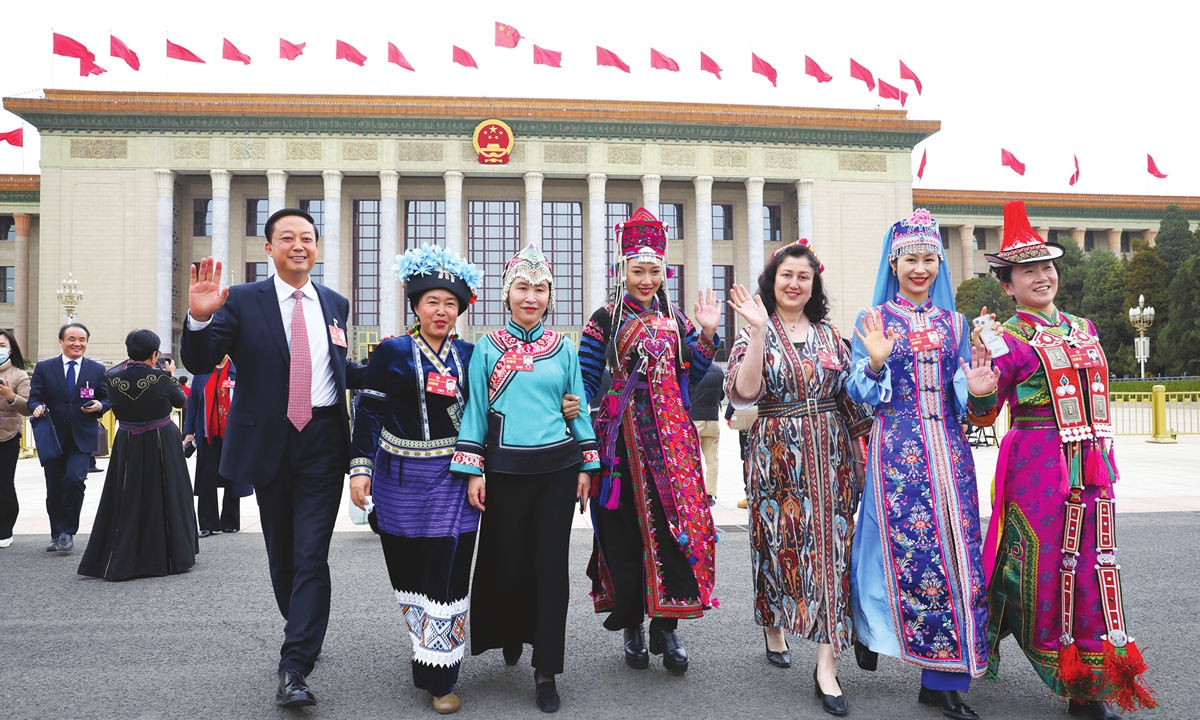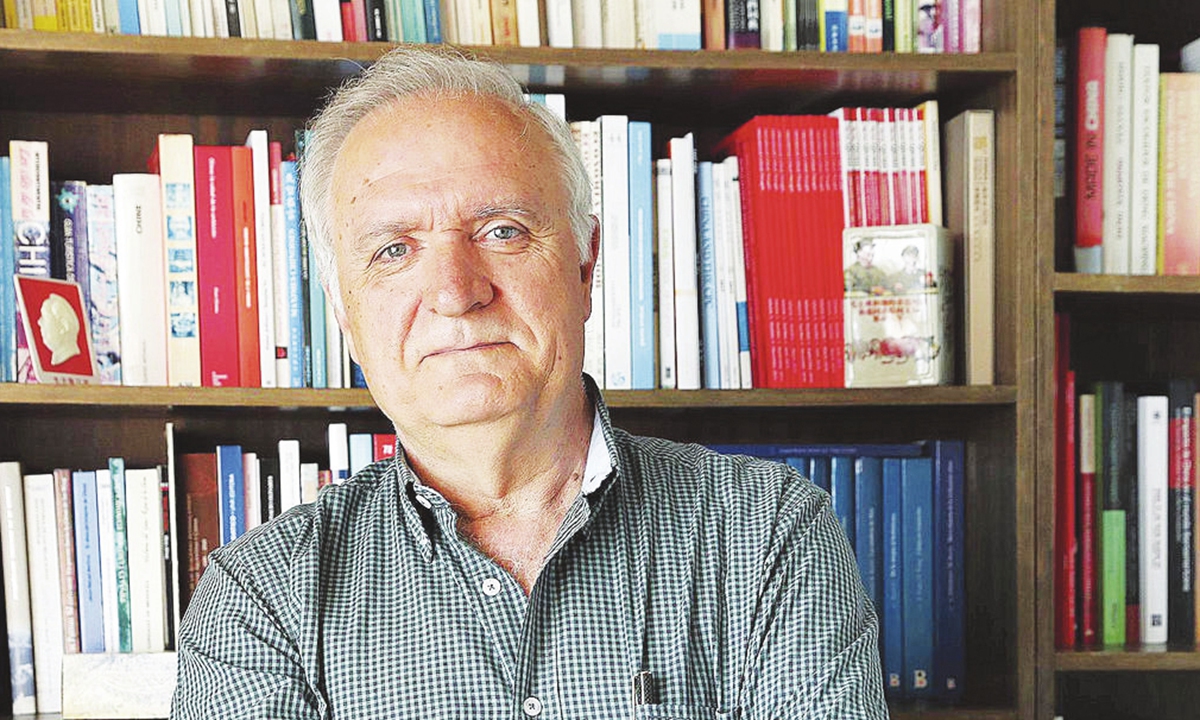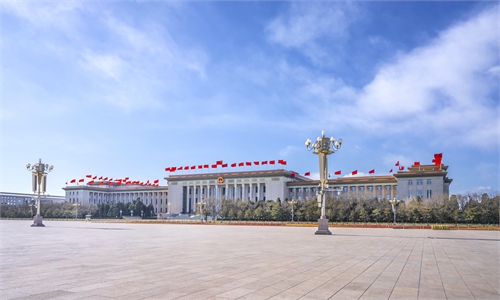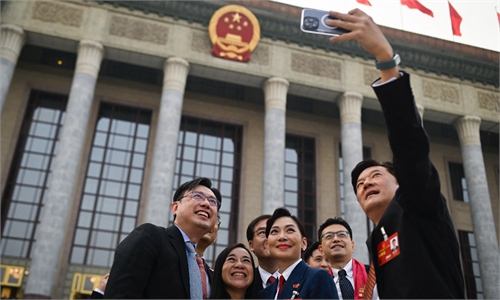
Members walk out of the Great Hall of the People in Beijing after the closing meeting of the first session of the 14th National Committee of the Chinese People's Political Consultative Conference on March 11, 2023. Photo: VCG
Editor's Note:The two sessions, one of China's most important annual political event, is an important window for the outside world to understand China's development achievements, plans, governance philosophy, diplomatic concepts and global initiatives. Through this window, international observers closely watch China's moves and recognize China's development and achievements.
When talking about Chinese modernization, Xulio Ríos (Ríos), emeritus advisor of the Observatory of Chinese Politics, a study and analysis working group in Spain, told Global Times (GT) reporter Xia Wenxin that China has few mirrors to look at in areas, such as the change in the development model, technological innovation and socialization of prosperity, and must devise its own solutions. "This has been done with great effort, combining both high and low beams in this vehicle that should lead it to the Second Centenary Goal, " he added.
This is the eighth interview of this series over the two sessions.

Xulio Ríos Photo: Courtesy of Ríos
GT: The just-concluded two sessions were the first after the 20th National Congress of the Communist Party of China (CPC). How do you view this year's sessions?Ríos: The two sessions are an event of great relevance in Chinese politics because they reflect the agenda. [This year,] we watched for changes in personnel and also for the incorporation of key ideas from the 20th CPC National Congress. In my view, the critical conceptual or central message, so to speak, is the revalidation of China's determination to continue striving to complete its modernization. The last few years have been particularly turbulent, from Donald Trump's presidency to the pandemic. These events have affected the planning of the objectives [of China], but they haven't invalidated them. Insisting on them and establishing the conditions for a new momentum may represent the thematic epicenter of the two sessions.
GT: You have praised China's whole-process people's democracy, saying that China's tremendous development achievements cannot be achieved without the stable environment created by China's democratic system. How do you view China's whole-process people's democracy? What are the misperceptions about it in the West? Is there any advantage of China's democratic system over the Western one?
Ríos: Stability is key to progress in development. This is true for any country, but even more so for China because of its specificity. In this context, it should be pointed out that, first and foremost, democracy must be comprehensive - not only political but also social, economic, and cultural. Progress must be made on all these fronts. We cannot limit it to a representative exercise.
The second point is adaptation so that each society can concur with elements that it considers convenient. Democracy is like the skeleton of a building, the beams that support coexistence and will ultimately make it habitable, but its internal structure and external appearance may vary.
We cannot underestimate what liberalism has contributed to democracy, nor what other alternative models can contribute, especially at a time like the present, when we are witnessing a crisis of democracy. Such a crisis has its direct origin in transforming hatred into a tool for political construction under the protection of the rising far-right politics in many countries. It also has its roots in the system's lack of response to the demands of the social majorities. It is impotent in the face of the deterioration of coexistence and the quality of a democracy that only seems efficient when it comes to the interests of the markets or financial power.
GT: During his speech Monday morning at the closing meeting of the first session of the 14th National People's Congress, Chinese President Xi Jinping noted that China should accelerate Chinese modernization following the strategic plan of the 20th CPC National Congress. How do you interpret the concept of the "Chinese path to modernization"? What do you think is its significance?
Ríos: Modernization is the inspiring premise of China's long historical endeavor. The singularities of the country determine the important weight of the genuine elements that define this path. From the large population, the revitalization of its own culture, sustainability, to the search for the common good together with the return to the world as an alternative reference point, [all these] mark Chinese modernization, which is nothing more than an expression of the eternal desire to progress without renouncing identity.
Chinese modernization, in essence, is progress with identity and with its own stamp. In this vision, it is possible to find answers that are better adapted to the conditions and demands of each context, which always has its own nuances. In the case of China, as it represents another pole of human experience, these nuances are very different from Western countries.
GT: When looking back at the world's modernization history, what are the main differences between the Chinese path to modernization and the Western one?
Ríos: Each historical stage has its context, and over the centuries, China has long been at the forefront of humanity, representing, to a large extent, modernity - one very much marked by its civilizational specificity. The modernization that represents the Chinese dream today, with which the country intends to close the cycle of bitter decadence, has as an essential fact: China has accomplished the task by carrying it, first, on the country's own shoulders and, second, projecting important benefits to others. Western modernization has largely been carried on the shoulders of others and projected sacrifices and exclusion onto them, the effects of which still remain to this day.
GT: In your opinion, what lessons Chinese modernization can provide other countries in the world? What direction will such a path eventually lead to?
Ríos: China's exploration is of enormous importance. History has not ended, nor has humanity's yearning for new balances in forming more developed, fairer, and freer societies. There is much global dissatisfaction, for example, with the increase in inequalities and the proliferation of imbalances of all kinds. It is important that people are at the top of the priorities of governments, and to ensure this, we need powers and policies orientated toward the common good.
After the end of what we know as real socialism, the perception that there is no systemic alternative has become widespread. In that sense, China's willingness to explore other options suggests more possibilities. There will be lessons for everyone in that process. And I believe that China is very wise and prudent in pointing out that just as it rejects the mechanical imposition of foreign experiences, the country seems to be also cautious about the universalization of its own [experiences]. That diversity of paths is also democracy.
GT: In an article in January, you wrote that the final management of the COVID-19 epidemic, economic recovery and easing tensions with the West are some of the major challenges China will face in 2023. In your opinion, how will China tackle these challenges in the new year?
Ríos: All of them are important challenges. And I believe there is full awareness of their significance. Moreover, a common thread runs through all of them, so there is a high level of interdependence between the three issues, although they are likely to evolve at different rates. Certainly, as we are already seeing, the final management of the pandemic opens up a horizon of positive expectations for economic recovery, which is of great importance for China and the whole world. In that sense, this dynamic may also help to alleviate certain tensions.
But the last problem [Note: to ease the tension with the West] is the most complicated as there is still a structural conflict that insists on trade and technological warfare or strategic pressure, which indicates very important limits to aspire to full normalization. This burden, in the form of a proto-Cold War, will continue to cloud the situation. It is important for China to explore the nuances and redouble its commitment to cooperation as opposed to confrontation.
GT: China has just come through a challenging decade, but during this period, many remarkable achievements have been achieved in the country. In an interview with Chinese media last year, you said your first impression of China's past decade was that the country has shown "great determination and resilience." Could you elaborate on this?
Ríos: What I meant by that is that despite the difficulties, some unexpected, that have arisen and complicated the achievement of the stated objectives, China has been careful to adapt to and tame those challenges. For example, growth has been affected and accepted, but at the same time, measures have been taken to prioritize objectives, such as ending extreme poverty. The period that the reform is going through is of paramount importance, and many tasks need to be tackled effectively. I am referring to the change in the development model, technological innovation, socialization of prosperity, and so on. In these areas, China has few mirrors to look at and must devise its own solutions. This has been done with great effort, combining both high and low beams in this vehicle that should lead it to the Second Centenary Goal.



